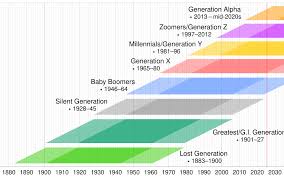Understanding Millennials: Trends and Their Impact on Society

Introduction
Millennials, those born between 1981 and 1996, are a generation that has been pivotal in shaping today’s economic and cultural landscape. With their unique values, preferences, and experiences, they have significantly influenced various sectors, from technology and consumer behavior to politics and social movements. As they continue to mature into adulthood, understanding millennials is crucial for businesses, policymakers, and society as a whole.
Key Characteristics of Millennials
Millennials are often characterised by a strong inclination towards social media and technology. Accustomed to the internet from a young age, they are adept at using digital platforms for communication and commerce. This generation also prioritises experiences over material goods, showcasing a preference for travel, dining, and entertainment that enriches their lives rather than traditional possessions.
Furthermore, millennials demonstrate a progressive mindset, advocating for social justice, environmental issues, and inclusion. According to a recent study by Deloitte, 83% of millennials believe that businesses should be actively involved in addressing societal challenges, highlighting their role as change-makers.
Challenges Faced by Millennials
Despite their adaptability, millennials face several challenges, particularly in financial stability. Many members of this generation entered the workforce during the Great Recession, which has affected their earning potential and job security. A report from the Institute for Fiscal Studies indicates that millennials are 20% poorer than previous generations at the same age, exacerbating issues such as student debt and housing affordability.
Additionally, the pressures of a fast-paced digital world can lead to heightened stress and mental health issues among millennials. Studies show that nearly 40% of millennials report feelings of anxiety related to work and personal life, emphasising the need for mental health resources and support systems.
Millennials and the Future
As millennials continue to enter their prime earning years, their economic influence is expected to grow. They are projected to make up 75% of the global workforce by 2025. This demographic shift will require businesses and governments to adapt to their preferences and values, prioritising sustainability, ethical practices, and innovation.
In terms of social impact, millennials are likely to play a vital role in addressing pressing global challenges such as climate change and inequality. Their commitment to activism, coupled with their consumer habits, holds the potential to drive significant change in corporate social responsibility and public policy.
Conclusion
Understanding millennials is not merely an academic exercise; it is essential for anyone seeking to connect with this influential generation. As they navigate their unique challenges and opportunities, the impact of millennials will be felt across various sectors, shaping the future in profound ways. By appreciating their values and needs, society can foster environments that support growth, innovation, and positive change.









